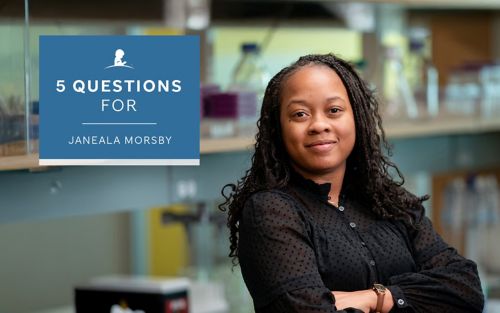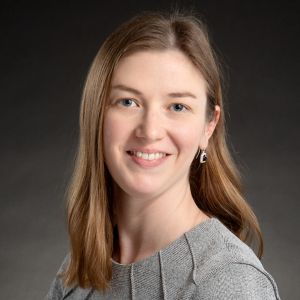St. Jude Family of Websites
Explore our cutting edge research, world-class patient care, career opportunities and more.
St. Jude Children's Research Hospital Home

- Fundraising
St. Jude Family of Websites
Explore our cutting edge research, world-class patient care, career opportunities and more.
St. Jude Children's Research Hospital Home

- Fundraising
5 Questions for Janeala Morsby, PhD

Janeala Morsby, PhD, is conducting research at St. Jude to advance studies in pediatric osteosarcoma, focusing on new treatment approaches for this aggressive cancer.
This question-and-answer series explores the motivations, inspirations and accomplishments of investigators at St. Jude. Janeala Morsby, PhD, is a postdoctoral researcher in the laboratory of Lillian Guenther, MD, in the St. Jude Department of Oncology. Her research focuses on novel genomic targets in osteosarcoma.
1. What do you like most about being a scientist?
Scientists are innovative and critical thinkers who constantly develop new ways to solve complex problems, from rare pediatric cancers to more common diseases. Often, scientists discover new drugs that target a specific gene dependency in cancer cells, which end up in the clinic, giving patients a better quality of life. This is what I like most about being a scientist. I like the thrill of discovering something new in research that can potentially give a cancer patient a chance to live a disease-free life. When you look at society today, it’s clear that so many children and adults are fighting various types of cancer, some that are treatable and others that are not yet understood. Being a postdoctoral associate allows me to contribute to creating new treatments or identifying new targets, which gives new hope to patients, which is truly exciting.
2. What questions are you trying to answer through your research?
My research focuses on finding new ways to treat pediatric osteosarcoma. Pediatric osteosarcoma is a malignant bone tumor frequently diagnosed in children. Currently, the main treatments that exist for this disease include chemotherapy and surgery. While this approach has led to 70% 5-year disease-free survival in patients with primary tumors, patients with metastatic disease have worse outcomes. Therefore, new treatment approaches are needed to provide effective therapeutic options for all patients.
Combination therapy approaches utilize multiple modes of treatment to attack cancer and are typically more effective than any one treatment. I’m currently studying combination approaches to treating pediatric osteosarcoma, using laboratory research to help inform which therapies work best together to provide insight into effectively killing cancer cells. Through my work, I hope to validate a novel combination treatment approach for pediatric osteosarcoma and that my findings will improve patient care.
3. What resources or capabilities set St. Jude apart as a great place to do research?
When I first arrived at St. Jude, I was shocked. I could not believe that I was here. The mission of this institution resonates with my core values as a developing scientist, and it is an exceptional place to do research. Several amazing shared resources here provide support for experiments and access to state-of-the-art facilities with great staff and personnel. These facilities make it easy for researchers to complete their research and obtain meaningful data. Aside from the facilities, the St. Jude faculty across various disciplines are always willing to share insight into your research or provide meaningful feedback. St. Jude is a great place to work because of the mission, the people, the resources and the environment on campus. Together, these allow researchers, graduate students, postdocs and scientists to make a true impact in service of the St. Jude mission.
4. How have mentors at the different stages of your training shaped your career?
I have had several mentors throughout my scientific journey, and they have all contributed positively to my career path. The first mentor I must mention is Mrs. Jean Harris, the founder of a non-profit organization, Passport to College. With her help, I secured a full scholarship to pursue a Bachelor of Science in Biochemistry at Claflin University. Her belief in me as a high school student helped me see a clearer path forward for my future in science.
While completing my undergraduate studies, I had several mentors, including Dr. Nicholas Panasik, who helped me start my first research project and exposed me to various research techniques and ideas. This propelled me to pursue a PhD in Biochemistry at the University of Notre Dame. There, I was mentored by Dr. Bradley Smith, who helped me learn how to bring projects to completion, write papers and secure research funding, which has been pivotal to my transition to a postdoc. Under his mentorship, I became an expert in several research techniques that allowed me to complete my research thesis in a timely manner.
I’m now being mentored here at St. Jude by Dr. Lillian Guenther in molecular oncology. She has been amazing to work with over the last year and a half. Dr. Guenther has helped me to expand my critical thinking capabilities and exposed me to different research techniques that will be extremely useful for my future career as a scientist. In addition, she has helped me to form meaningful connections here at St. Jude, which has expanded my network and will be invaluable for my next steps as a scientist.
5. What advice would you give to people considering careers in science?
The advice I would give people considering careers in science is to choose a field that aligns with their passions. I believe that if you enjoy the work you do, then you will be successful at it. However, while following your passions is important, you shouldn’t be afraid to try something new. Often, the unknown can be more rewarding than the path already known. Regardless of your choice, just give it your best every day. Learn to work smart and build a strong professional community around you as you go along. The connections you form along the way will make a huge difference on your journey.
In addition, when difficulties arise, face them head-on as much as possible. Do not be afraid of failing, as often it’s our failures that will help us to be more successful. In science, failure is often unavoidable, so get comfortable failing and having bad days. That way, you can learn quickly and move forward instead of getting stuck. My mom often said that no matter how great you are at something, you will fail somehow, so learn to pick yourself up, brush yourself off and start again. Never get stuck. In addition, celebrate every win, no matter how small. This will keep your positive energy flowing. Learn to use feedback to grow instead of focusing on negatives. Use everything on your journey as a learning opportunity. As much as you can, try not to take anything personally. Remember you are choosing a rewarding field where you will constantly learn and grow. Finally, enjoy the science you do and make the best of every day as much as possible.







